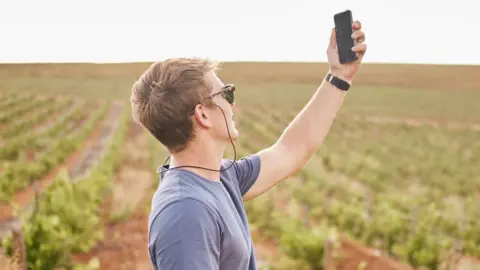Zoe KleinmanTechnology editor
 Getty Images
Getty ImagesVirgin Media O2 is set to become the first mobile network operator to offer UK customers automatic connectivity via satellite in places without phone signal.
O2 Satellite will be an optional service due to launch in the first half of 2026, following a partnership with Elon Musk’s satellite business Starlink to offer the service.
The firm has not yet revealed how much it will cost, but it will be an additional fee to pay each month.
Enabled smartphones will automatically switch to satellite coverage in parts of the UK where no terrestrial signal is available – such as rural areas – but those who sign up will not be able to make phone calls via satellite to begin with.
The service will only work with messaging, maps and location apps. O2 says this is because Starlink’s current satellites do not support calls, although the next generation of them will.
Calls made via WhatsApp, which uses data rather than phone signal, may work though. O2 intends to trial this before the service launches to the public.
The satellites will effectively act like “phone masts in the sky”, said Luke Pearce from analyst CCS Insight.
“In today’s world, connectivity is no longer optional,” he said.
“Whether it’s emergency SOS in life-saving situations or keeping a software-defined vehicle online, people now expect constant access.”
Software-defined vehicles can receive over-the-air updates to improve their performance and features, but need internet connections to be able to do so.
“Satellite is the only technology that can truly close the coverage gap across mountains, oceans and rural areas,” Mr Pearce added.
Satellite battle takes off
O2’s move comes several months after rival Vodafone carried out a successful live video call via satellite from a mountain in Wales where there was no other signal.
It claimed this was a UK first, but it has not yet revealed any plans to roll out satellite-to-device services to customers.
Vodafone’s tech worked with the satellite firm AST, which currently has six satellites in orbit and aims to have up to 60 by the end of 2026.
Starlink, meanwhile, has more than 650 satellites and has already launched similar services with phone networks in other countries including Australia, New Zealand, the US, Canada and Japan.
In the UK, Ofcom tweaked its regulations in September to enable satellite connectivity directly to smartphone devices.
Currently it is only possible to use it to text emergency services from newer iPhone and Android handsets.
But the use of low-earth orbit satellites for mobile communications has been criticised by astronomers, who say they pollute the night sky and make it more difficult to spot potential hazards such as asteroids.


